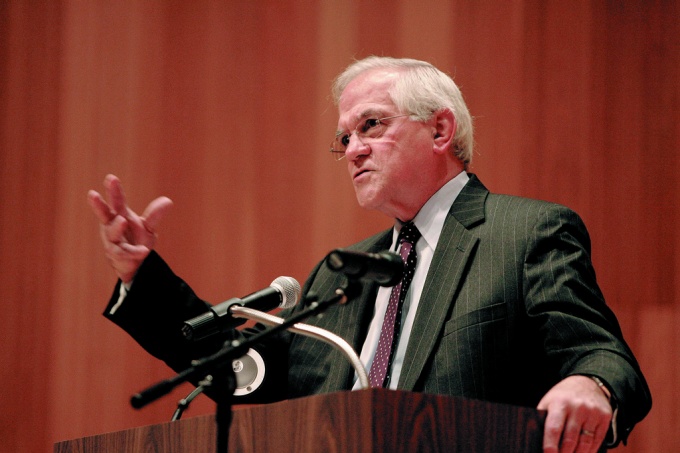
“Quo Vadis Habeas Corpus?"
The Mitchell Lecture - 2007 (Fall)
Hon. James Robertson, U.S. district judge for the District of Columbia, delivered the 2007 Mitchell address.
Hon. James Robertson, a former Mississippi civil rights lawyer, was appointed to the bench in 1994. In November 2004, he issued the initial decision in a case granting a Guantanamo Bay detainee's petition for a writ of habeas corpus, a decision that was upheld by the U.S. Supreme Court. He also served on the Foreign Intelligence Surveillance Court for more than three years, stepping down in December 2005 after the Bush administration disclosed the National Security Administration's warrantless surveillance program.
His address, titled "Quo Vadis Habeas Corpus?," was delivered in Lippes Concert Hall. In it, the jurist discussed the origins and development of the "Great Writ," an essential legal tool and safeguard against overzealous government action.
"Recent events reveal how little understood is the writ of habeas corpus, and how much the writ is at risk of becoming a rather impotent legal anachronism," he said. "The writ has been reduced in our own time to a procedural quagmire for jailhouse lawyers, and it has been treated by our judiciary, I fear, as a nuisance."
The concept, Robertson said, stems from the Magna Carta in 1215. "Habeas corpus," he said, "does not mean 'produce the body.' It means, 'You have the body.'" The sense, he said, was "You have the body of William. Bring him to me and show what legal cause you have for detaining him."
"That was the gist of a writ of habeas corpus in the 16th century."
Robertson told his listeners some of the writ's long and complex history, including, from the start, demands for exceptions from habeas corpus in times of threat to the public security. He noted that Article 1, Section 9, of the U.S. Constitution specifies that "the privilege of the writ of habeas corpus shall not be suspended unless when in cases of rebellion or invasion the public safety may require it." Habeas corpus, he noted, was the only common-law writ mentioned in the Constitution.
The exceptions are where it gets tricky. Robertson cited, for example, an instance in 1806 when President Thomas Jefferson asked Congress to suspend habeas corpus for three months because of a suspicion that Aaron Burr and two others were engaged in a treasonous conspiracy to seize U.S. lands. The House of Representatives rejected the request.
President Abraham Lincoln, too, suspended habeas corpus often during the Civil War. "There was no effective opposition to what Lincoln did," Robertson said. "His Republican Party controlled Congress, the Southern states had withdrawn, and the courts were at a low point in their power. The president had a clear field upon which to act, and act he did, issuing further proclamations suspending the privilege of the writ throughout the country, and authorizing the arrest of any person guilty of any disloyal practice affording aid and comfort to rebels against the authority of the United States."
By 1945, Robertson said, habeas had become a vehicle for challenging convictions outside the facts, such as denial of the right to consult with counsel. The number of such cases has grown dramatically, especially in capital cases, spurring the 1995 Anti-terrorism and Effective Death Penalty Act, which imposed a one-year limitation on filing habeas petitions.
"So here we are in 2007," Robertson said. "We have no jurisdiction of habeas petitions by alien combatants or suspected ones; we have no power to hear post-conviction claims more than a year old. Where are you going, habeas corpus? The answer, in my opinion, is nowhere, unless attention is paid to several problems."
These, he said, include delays in moving habeas applications through the judicial system; procedural obstacles that confront prisoners seeking review of their convictions; and the jurisdiction-stripping provision of the Military Commissions Act of 2006. "When Congress silences the judiciary, it abdicates its historic role in the system of checks and balances," the judge said.
"Congress may soon consider legislation that would restore habeas to where it was before the Military Commissions Act," he said. "My suggestion, my wish, is that Congress would do more than that. We seem to be at one of those moments in history where the vectors of power are changing. At such moments, the writ of habeas corpus has been vulnerable or it has been ascendant. Now is the time when Congress should not only restore full habeas corpus jurisdiction to the federal courts, but also revisit its history and the fundamental purposes of the Great Writ, and repair it."
Specifically, he said, lawmakers should consider "removing or reducing the procedural barriers that so often frustrate habeas petitions; insist on prompt, timely handling of habeas petitions, perhaps by enacting public reporting requirements; and most importantly, proclaim that the federal writ of habeas corpus shall run to any place in the world where people may be detained or otherwise deprived of their freedom by officers or agents of the American government, so that American justice may be and may be seen to be present wherever America shows her flag, projects her power and influence, and trumpets her values of liberty and freedom."